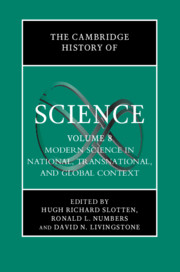Book contents
- The Cambridge History of Science
- The Cambridge History of Science
- The Cambridge History Of Science
- Copyright page
- Contents
- Notes on Contributors
- General Editors’ Preface
- 1 Introduction
- Part I Transnational, International, and Global
- 2 Science and Imperialism since 1870
- 3 The Geomagnetic Project: Internationalism in Science between the French Revolution and the Franco-Prussian War
- 4 International Science from the Franco-Prussian War to World War Two: An Era of Organization
- 5 Internationalism in Science After 1940
- 6 International Science in Antarctica
- 7 Missionary Science
- 8 Museums of Natural History and Science
- 9 National Scientific Surveys
- 10 Expeditionary Science
- Part II National and Regional
- Index
10 - Expeditionary Science
from Part I - Transnational, International, and Global
Published online by Cambridge University Press: 21 March 2020
- The Cambridge History of Science
- The Cambridge History of Science
- The Cambridge History Of Science
- Copyright page
- Contents
- Notes on Contributors
- General Editors’ Preface
- 1 Introduction
- Part I Transnational, International, and Global
- 2 Science and Imperialism since 1870
- 3 The Geomagnetic Project: Internationalism in Science between the French Revolution and the Franco-Prussian War
- 4 International Science from the Franco-Prussian War to World War Two: An Era of Organization
- 5 Internationalism in Science After 1940
- 6 International Science in Antarctica
- 7 Missionary Science
- 8 Museums of Natural History and Science
- 9 National Scientific Surveys
- 10 Expeditionary Science
- Part II National and Regional
- Index
Summary
By 1800, after three centuries of extraordinary and at times violent explorations driven by a complex mixture of capitalism, Christianity, and conquest, Europeans had produced fairly complete maps of the coastal outlines of the globe and brought back to their capital cities elaborate accounts of, and specimens by the shipload from, what they saw as a New World. In so doing, they had radically changed the form and content of all the major sciences in Europe. Whereas in 1500 a botanical book might list hundreds of different species, by 1800 there were tens of thousands recorded and no end in sight; and whereas in 1500 a geographer might be able to sketch out portions of the continents of Africa, Europe, and Asia with wildly varying degrees of accuracy, by 1800 he could precisely map those continents as well as Australia and the Americas and myriad islands in between.
- Type
- Chapter
- Information
- The Cambridge History of Science , pp. 137 - 148Publisher: Cambridge University PressPrint publication year: 2020

